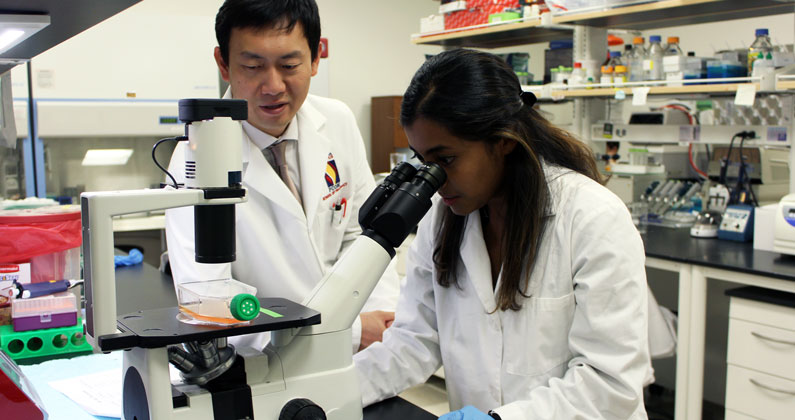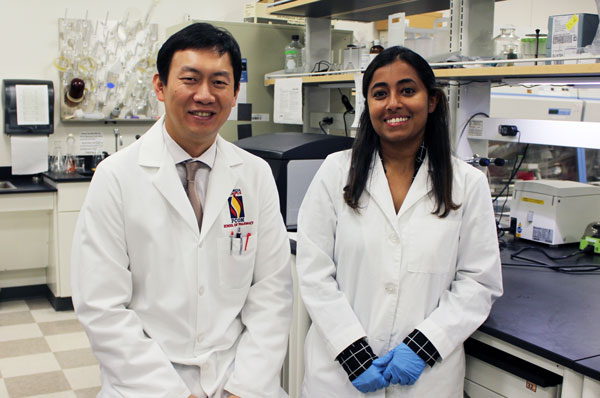Student Research Spotlight
Teena John (PharmD ’19)
September 28, 2017
Teena John (PharmD) worked under Dr. Xinyu (Eric) Wang to study the anti-myeloma effect
of certain compounds.
Teena John (PharmD ‘19) is currently a third year student in the pharmacy program at GA-PCOM. She graduated with a bachelor’s in biology from the University of Florida. She hopes
to pursue a career in clinical development within the pharmaceutical industry upon
completing pharmacy school.
What did you study?
I worked under Xinyu (Eric) Wang, PhD, associate professor of pharmaceutical sciences, to study the anti-myeloma effect
of imidazole and methyl derivatives of a synthetic oleanane triterpenoid, 2-Cyano-3,12-Dioxooleana-1,9-Dien-28-Oic
Acid (CDDO). Multiple myeloma is a plasma cell disorder characterized by the proliferation
of malignant plasma cells in the bone marrow. These plant-derived compounds have been
studied to show pharmacologic activity towards inhibiting proliferation of various
tumor cell lines. The focus of our project was to determine whether both derivatives
of CDDO reduced viability and induced apoptosis in multiple myeloma cells.
What prompted you to pursue research?
I’ve always had an interest and curiosity in scientific research. I first got involved
in the research setting as an undergraduate at the University of Florida. It was exciting
being involved in an environment that was constantly developing with limitless boundaries.
After starting at GA-PCOM, I knew I wanted to become involved in research throughout
pharmacy school, particularly in oncology. I was led to Dr. Wang, whose focus lies
in the drug discovery of new compounds with anti-cancer and anti-inflammatory properties.
I was immediately drawn to his research and knew I wanted to be involved.
What experience do you have with conducting research?
While at the University of Florida, I was a research assistant for Dr. Joseph McNamera
in the department of psychiatry. The research involved facilitating the Tower of London
test to assess for executive functioning, specifically to detect for deficits related
to planning in children. After my first year of pharmacy school, I was an R&D intern
at Allergan where I was involved in assisting in research for a method development
project quantitating aldehydes and ketones through HPLC analysis. In the fall of 2016,
I began working for Dr. Wang at GA-PCOM in the research lab.
 What were your responsibilities in the research project?
What were your responsibilities in the research project?
I assisted in culturing three different multiple myeloma cell lines and performing
cell viability assays, exposing the cells to CDDO-Im and CDDO-Me at dosage concentrations
ranging from (0-0.5μM). The cells were incubated for 24, 48 and 72 hours to measure
cell viability at each time point. We then performed flow cytometric analysis which
determined that apoptosis was induced by both derivatives. Our results showed that
these potent compounds both inhibited growth and induced apoptosis in a dose and time-dependent
manner. I had the opportunity to prepare a poster and present this research at GA-PCOM’s annual Research Day in May alongside Jonathan Park and Jay Mehta.
What is the broader impact of your research?
The American Cancer Society predicts that there will be 30,280 new cases of multiple
myeloma in 2017. While it is a relatively uncommon cancer, life expectancy is only
around five years. Current treatment options include thalidomide, lenalidomide, bortezomib
and hematopoietic stem-cell transplants. Although treatment regimens have significantly
improved over the past decade, the disease remains incurable with the majority of
patients relapsing after initial therapy. Even in this era of revolutionary drug development,
there is still an urgent need for less toxic drugs that will achieve longer remission
rates for patients. Dr. Wang’s efforts in identifying new and novel therapeutic agents
from natural sources to combat this aggressive malignancy is truly inspiring. I feel
fortunate to have had the opportunity to work under him during my academic career.
You May Also Like:
About PCOM Georgia
Established in 2005, PCOM Georgia is a branch campus of Philadelphia College of Osteopathic Medicine (PCOM), a private,
not-for-profit, accredited institution of higher education with a storied 125-year
history dedicated to the healthcare professions. Located in Suwanee (Gwinnett County),
PCOM Georgia offers doctoral degrees in osteopathic medicine, pharmacy and physical
therapy. Graduate degrees are offered in biomedical sciences, medical laboratory science
and physician assistant studies. The campus joins PCOM South Georgia in Moultrie in
helping to meet the healthcare needs of the state. Emphasizing "a whole person" approach
to care, PCOM Georgia focuses on educational excellence, interprofessional education
and service to the community. For more information, visit pcom.edu or call 678-225-7500. The campus is also home to the Georgia Osteopathic Care Center,
an osteopathic manipulative medicine clinic, which is open to the public by appointment.
For more information, visit pcomgeorgiahealth.org.
Contact Us
Jamesia Harrison, MS
Assistant Director, News and Media Relations
Email: jamesiaha@pcom.edu
Office: 678-225-7532 | Cell: 470-572-7558
Connect with PCOM Georgia

 What were your responsibilities in the research project?
What were your responsibilities in the research project?